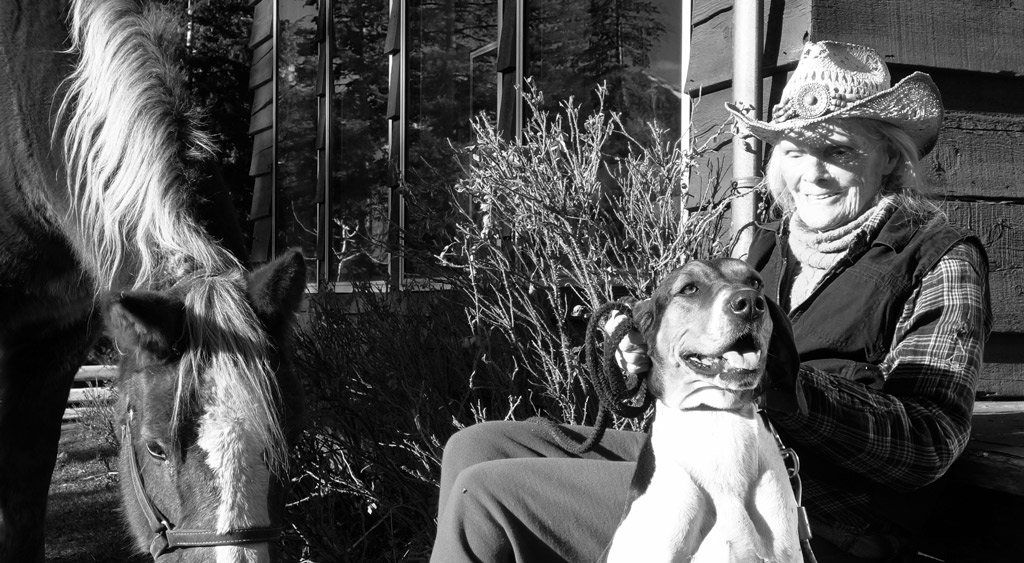
As part of our weekly Transformational Journey Review, we present the book “Gerry, Get Your Gun” which is written by Kevan’s mother, Gerry Bracewell to inspire people with her story about her life as the first female licensed hunt guide in British Columbia. She was born in 1922 and published her book at the age of 93. I read her book during my first month at the ranch and was inspired by her stories of being in the wilderness as well as her determination and perseverance. I was also very excited to meet Gerry in person a few weeks later.
The concept at the ranch is that every opportunity or task is available for you to learn if you are willing to take initiative. The great outcome is that you can experience things which you would probably not experience in your ordinary environment such as logging, driving the skidder or CAT, cooking for a lot people, joining trips to one of our many camps in the area, guiding guests, working with horses and using the chainsaw. The learning process helps you to grow personally through the challenges and it is up to you what you make out of your time. Thereby the ranch philosophy embodies empowerment, taking ownership and personal development through nature. By reading Gerry’s book about her adventures in the wilderness, it encourages you to explore everything that is offered to you at the ranch curiously, so it doesn’t matter if you have previous experience or not. The most important concept that we have at the ranch is the feeling of equality and a strong community with the outcome of empowerment, especially female empowerment.
Gerry Bracewell wants to inspire people who are interested in adventures in the wilderness, want to take responsibility for their own lives, goals and plans and she wants to motivate them to strive for the best. Being the first female hunt guide in BC was challenging not only because of spending so much time in the wilderness around predators, but also because she was fighting for acceptance in a male dominated industry. She got curious when her brothers went out in the bush and didn’t doubt in her abilities. Instead she motivated herself by thinking she could do it and wanted to see what was out there. Through her journey as a female hunt guide, she didn’t feel pressured to compete with male hunt guides. She had her own show, so she did what she wanted and they did what they wanted. Her goal was to make people feel safe in the wilderness.
Gerry didn’t really get accepted in the industry by her male colleagues or some guests. Her response when she faced men talking women down was to speak up – “I am sick and tired of it. You have forgotten who made it available for you to be on this place. (…)
I wanted to stop this stupidity, because it’s not fair”. Once, a newspaper article was going to be published about her as an experienced hunt guide and she invited the reporters over. When Gerry opened the door to her 2 male guests, they were so shocked that a woman named Gerry opened the door. Instead of treating her respectfully, they laughed and were surprised that the expected hunt guide they were supposed to interview, was a woman.
Gerry can still laugh about these stories and she always stayed true to herself. Although she didn’t receive much support in the industry, she was just as capable to be a hunt guide as her male colleagues were – just in a feminine manner.
Her story inspired me, because she believed in herself when others didn’t and trusted in herself that she could do it. Gerry definitely is a role model for me, because she embodies female empowerment, although that movement was just starting back then and it was even more difficult than today. She didn’t expect to write a whole book about her adventures, but she wanted to give advice to those who have the same interest in being a hunt guide as she has. It’s definitely difficult due to the people who don’t accept you, but her book is truly inspiring and should help you to figure out, if you are ready for this step in the industry.
She is passionate about what she has achieved in life and enjoyed being in the wilderness. Make sure to listen to our podcast to hear her yodeling when she was facing predators, that’s why she never got attacked by them.
Although Gerry’s story of breaking into a male dominated industry began in the 1940’s, sexism and inequality is still an issue today. People have to face different treatment, just because somebody thinks they are different. Who are we to define being “normal” or different? Gender, religion, age, nationality or sexuality shouldn’t affect how we treat each other, so people should ask themselves how they want to be treated whether inequality affects them or not. In our supportive ranch community, we do not base decisions on people’s backgrounds or stereotypes. We believe a person’s attitude, commitment to self-development and contribution to the ranch community is all that matters. Society still has a way to go socially and at the ranch we all hope that inequality will no longer be an issue in the future.
Marilen, 22, Germany
December 2019



